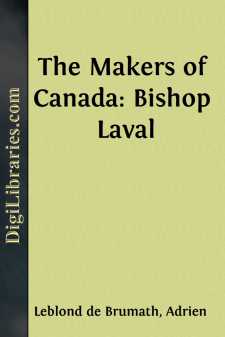Categories
- Antiques & Collectibles 13
- Architecture 36
- Art 48
- Bibles 22
- Biography & Autobiography 813
- Body, Mind & Spirit 142
- Business & Economics 28
- Children's Books 17
- Children's Fiction 14
- Computers 4
- Cooking 94
- Crafts & Hobbies 4
- Drama 346
- Education 46
- Family & Relationships 57
- Fiction 11829
- Games 19
- Gardening 17
- Health & Fitness 34
- History 1377
- House & Home 1
- Humor 147
- Juvenile Fiction 1873
- Juvenile Nonfiction 202
- Language Arts & Disciplines 88
- Law 16
- Literary Collections 686
- Literary Criticism 179
- Mathematics 13
- Medical 41
- Music 40
- Nature 179
- Non-Classifiable 1768
- Performing Arts 7
- Periodicals 1453
- Philosophy 64
- Photography 2
- Poetry 896
- Political Science 203
- Psychology 42
- Reference 154
- Religion 513
- Science 126
- Self-Help 84
- Social Science 81
- Sports & Recreation 34
- Study Aids 3
- Technology & Engineering 59
- Transportation 23
- Travel 463
- True Crime 29
The Makers of Canada: Bishop Laval
Description:
Excerpt
CHAPTER I
ESTABLISHMENT OF THE CATHOLIC CHURCH IN CANADA
If, standing upon the threshold of the twentieth century, we cast a look behind us to note the road traversed, the victories gained by the great army of Christ, we discover everywhere marvels of abnegation and sacrifice; everywhere we see rising before us the dazzling figures of apostles, of doctors of the Church and of martyrs who arouse our admiration and command our respect. There is no epoch, no generation, even, which has not given to the Church its phalanx of heroes, its quota of deeds of devotion, whether they have become illustrious or have remained unknown.
Born barely three centuries ago, the Christianity of New France has enriched history with pages no less glorious than those in which are enshrined the lofty deeds of her elders. To the list, already long, of workers for the gospel she has added the names of the Récollets and of the Jesuits, of the Sulpicians and of the Oblate Fathers, who crossed the seas to plant the faith among the hordes of barbarians who inhabited the immense regions to-day known as the Dominion of Canada.
And what daring was necessary, in the early days of the colony, to plunge into the vast forests of North America! Incessant toil, sacrifice, pain and death in its most terrible forms were the price that was gladly paid in the service of God by men who turned their backs upon the comforts of civilized France to carry the faith into the unknown wilderness.
Think of what Canada was at the beginning of the seventeenth century! Instead of these fertile provinces, covered to-day by luxuriant harvests, man's gaze met everywhere only impenetrable forests in which the woodsman's axe had not yet permitted the plough to cleave and fertilize the soil; instead of our rich and populous cities, of our innumerable villages daintily perched on the brinks of streams, or rising here and there in the midst of verdant plains, the eye perceived only puny wigwams isolated and lost upon the banks of the great river, or perhaps a few agglomerations of smoky huts, such as Hochelaga or Stadaconé; instead of our iron rails, penetrating in all directions, instead of our peaceful fields over which trains hasten at marvellous speed from ocean to ocean, there were but narrow trails winding through a jungle of primeval trees, behind which hid in turn the Iroquois, the Huron or the Algonquin, awaiting the propitious moment to let fly the fatal arrow; instead of the numerous vessels bearing over the waves of the St. Lawrence, at a distance of more than six hundred leagues from the sea, the products of the five continents; instead of yonder floating palaces, thronged with travellers from the four corners of the earth, then only an occasional bark canoe came gliding slyly along by the reeds of the shore, scarcely stopping except to permit its crew to kindle a fire, to make prisoners or to scalp some enemy.
A heroic courage was necessary to undertake to carry the faith to these savage tribes. It was condemning one's self to lead a life like theirs, of ineffable hardships, dangers and privations, now in a bark canoe and paddle in hand, now on foot and bearing upon one's shoulders the things necessary for the holy sacrament; in the least case it was braving hunger and thirst, exposing one's self to the rigours of an excessive cold, with which European nations were not yet familiar; it often meant hastening to meet the most horrible tortures. In spite of all this, however, Father Le Caron did not hesitate to penetrate as far as the country of the Hurons, while Fathers Sagard and Viel were sowing the first seeds of Christianity in the St. Lawrence valley. The devotion of the Récollets, to the family of whom belonged these first missionaries of Canada, was but ill-rewarded, for, after the treaty of St. Germain-en-Laye, which restored Canada to France, the king refused them permission to return to a region which they had watered with the sweat of their brows and fertilized with their blood.
The humble children of St. Francis had already evangelized the Huron tribes as far as the Georgian Bay, when the Company of the Cent-Associés was founded by Richelieu....


